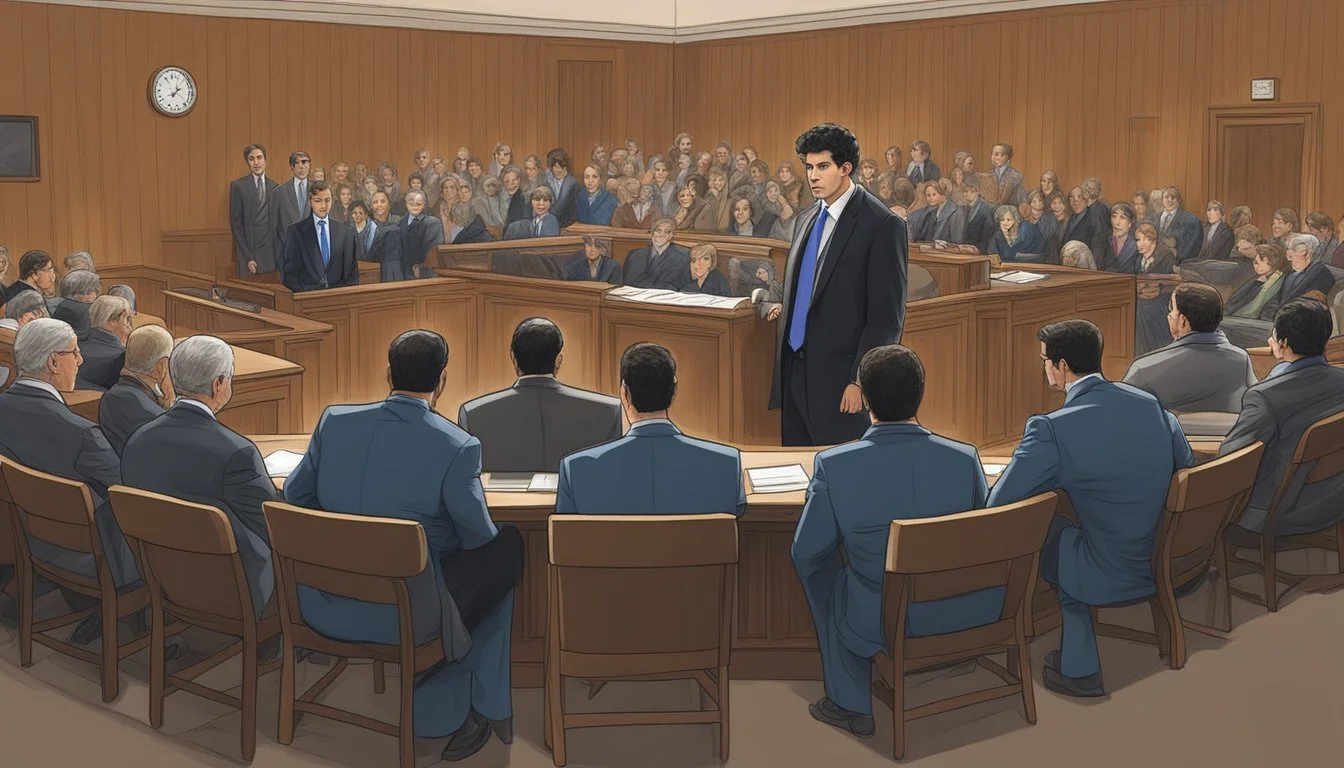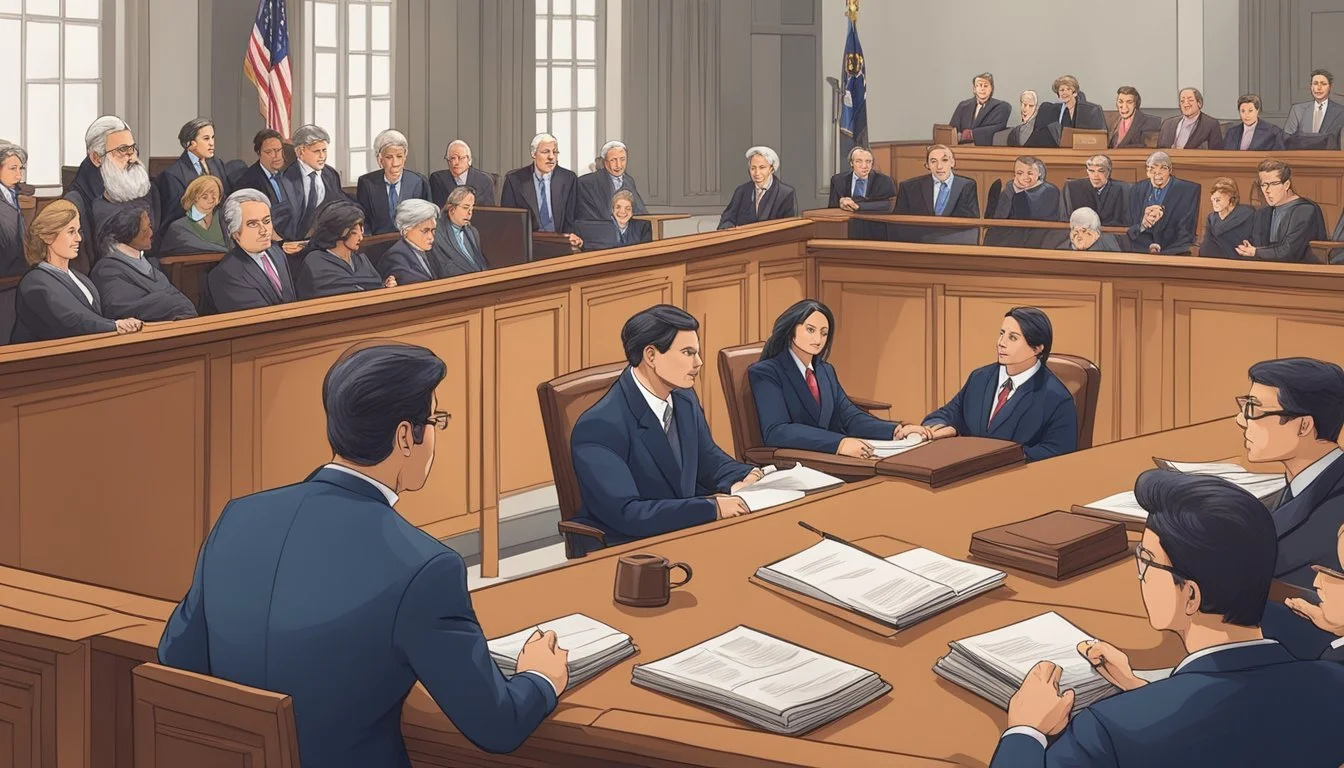Profiting from Pain: The Ethics of Monetizing the Menendez Brothers' Story
Examining Media Exploitation
The Menendez brothers' case continues to captivate audiences decades after the shocking murders of their parents. Netflix's recent series "Monsters: The Lyle and Erik Menendez Story" has reignited public interest in this infamous true crime saga. The show's popularity raises questions about the ethics of profiting from such tragic events.
While the Menendez brothers themselves have not received payment for the Netflix series, the streaming giant stands to gain substantial revenue from viewers' morbid curiosity. This scenario exemplifies a broader trend in the entertainment industry, where true crime stories are increasingly adapted into profitable content. The practice prompts debate over the morality of monetizing real-life tragedies and the potential impact on victims' families.
Critics argue that such productions exploit human suffering for financial gain, while supporters contend they serve educational purposes and maintain public awareness of important cases. The Menendez brothers' story, with its complex themes of abuse, wealth, and family dysfunction, presents a particularly challenging ethical dilemma for content creators and consumers alike.
Background of the Menendez Brothers
Lyle and Erik Menendez gained notoriety for the brutal murder of their parents in their Beverly Hills mansion. Their case captivated the public due to the shocking nature of the crime and the family's affluent lifestyle.
The Early Life of Lyle and Erik Menendez
Lyle and Erik Menendez were born into a life of privilege. Lyle, the elder brother, was born in 1968, while Erik followed in 1970. Their father, Jose Menendez, was a successful Cuban-American business executive. Their mother, Kitty, was a homemaker and socialite.
The brothers grew up in an affluent environment, first in New Jersey and later in California. They attended elite private schools and had access to numerous opportunities. Despite their outward appearance of success, the Menendez household reportedly had underlying tensions.
Both Lyle and Erik showed promise in academics and sports, particularly tennis. However, they also exhibited behavioral issues and struggled with the high expectations set by their father.
The Beverly Hills Family and Jose Menendez
In 1986, the Menendez family moved to a mansion in Beverly Hills, elevating their already luxurious lifestyle. Jose Menendez had become a highly successful entertainment executive, serving as CEO of LIVE Entertainment.
The family's Beverly Hills home became a symbol of their wealth and status. Jose was known for his ambitious and controlling nature, pushing his sons to excel in all areas of life. Kitty, while supportive, was said to struggle with depression and substance abuse.
Despite their opulent surroundings, the Menendez household was fraught with tension. Jose's demanding personality and high expectations created a pressure-cooker environment for his sons. This dynamic would later play a crucial role in the brothers' defense during their murder trial.
The family's lavish spending and outward appearance of success masked deeper issues that would ultimately lead to tragedy.
The Crime that Shocked the Nation
On August 20, 1989, a horrific double murder in Beverly Hills captivated the nation and spawned a media frenzy. The case involved two young brothers accused of killing their wealthy parents in a brutal act that would forever change their lives.
Details of the Murder
Lyle and Erik Menendez, aged 21 and 18 respectively, shot their parents Jose and Kitty Menendez multiple times with shotguns in their Beverly Hills mansion. The brothers initially claimed they were not home during the killings and had discovered the bodies upon returning from a movie.
The crime scene was particularly gruesome, with both victims suffering numerous gunshot wounds. Jose Menendez was shot in the back of the head while watching television, while Kitty was shot multiple times as she tried to escape.
Police found no signs of forced entry, raising suspicions about the brothers' involvement. The murder weapons were never recovered.
Public Reaction to the Menendez Family Tragedy
The Menendez case quickly became a media sensation, captivating audiences across the United States. The stark contrast between the family's wealthy Beverly Hills lifestyle and the brutal nature of the crime fueled public interest.
As details emerged about the brothers' lavish spending spree following the murders, public opinion began to turn against them. The purchase of expensive cars, watches, and a restaurant raised questions about their motives.
The trial, televised live, drew massive viewership. The brothers' defense strategy, which included claims of long-term sexual and emotional abuse by their father, shocked many and divided public opinion.
Some sympathized with the brothers' abuse claims, while others saw them as cold-blooded killers motivated by greed. The case sparked debates about family dynamics, wealth, and the nature of justice in high-profile crimes.
The Trials of Lyle and Erik Menendez
The murder trials of Lyle and Erik Menendez captivated the nation, becoming a media sensation and legal spectacle. The brothers' defense strategy, intense public scrutiny, and ultimate sentencing shaped a landmark case in American criminal justice.
Media Coverage and the 'Court of Public Opinion'
The Menendez trials drew unprecedented media attention. Television cameras in the courtroom broadcast the proceedings live, turning the case into a real-life legal drama. Millions of viewers tuned in daily, dissecting every piece of evidence and testimony.
This intense scrutiny created a "court of public opinion" that ran parallel to the legal proceedings. Newspapers, magazines, and television shows debated the brothers' guilt or innocence. The media frenzy influenced public perception and raised questions about fair trials in high-profile cases.
Experts and armchair detectives alike speculated on the brothers' motives and the validity of their defense claims. The case became a cultural touchstone, inspiring books, movies, and TV shows for decades to come.
Legal Strategy and Defense Arguments
The Menendez brothers' defense team employed a bold strategy: admitting to the killings while claiming self-defense. They argued that years of physical, emotional, and sexual abuse at the hands of their parents drove the brothers to commit the murders.
Key evidence included:
Erik's confession to his psychologist
Testimony from family members and acquaintances
Expert witnesses on child abuse and its psychological effects
The prosecution countered by portraying the brothers as cold-blooded killers motivated by greed. They highlighted the brothers' lavish spending after the murders and inconsistencies in their stories.
Both trials ended in hung juries, necessitating retrials. The second trials resulted in convictions for first-degree murder.
Sentencing and Life After the Trials
On July 2, 1996, Lyle and Erik Menendez were sentenced to life in prison without the possibility of parole. The judge rejected their plea for leniency, citing the brutal nature of the crimes.
In prison, the brothers have:
Married while incarcerated
Pursued education and various prison programs
Maintained their innocence regarding premeditated murder
Recent years have seen renewed interest in the case, with some advocates calling for reevaluation based on evolving understanding of trauma and abuse. Netflix's 2024 series "Monsters: The Lyle and Erik Menendez Story" reignited public debate about the brothers' culpability and the justice system's handling of abuse claims.
Cultural Impact and Media Exploitation
The Menendez brothers case has left an indelible mark on American culture, spawning numerous adaptations and sparking debates about true crime storytelling. Media coverage and entertainment productions have both informed and exploited public interest in this tragic family saga.
Adaptations and Documentaries about the Menendez Brothers
Netflix's "Monsters: The Lyle and Erik Menendez Story" brought renewed attention to the case. This series, produced by Ryan Murphy, delved into the brothers' lives and the events leading to their parents' murders.
ABC's "The Menendez Murders: Erik Tells All" featured Erik Menendez sharing his perspective. Barbara Walters conducted high-profile interviews with the brothers, further cementing their place in pop culture.
These productions often walk a fine line between education and sensationalism. They aim to provide insights into the case while also capitalizing on its shocking nature to attract viewers.
Ethical Considerations of True Crime Storytelling
The proliferation of Menendez brothers content raises ethical questions about true crime storytelling. Critics argue that such productions can glorify violence and retraumatize victims' families.
Creators face the challenge of balancing factual reporting with entertainment value. There's a risk of oversimplifying complex issues or focusing too heavily on gruesome details for shock value.
Financial gain from crime coverage is another contentious issue. Networks and streaming platforms profit from these stories, potentially at the expense of victims' dignity and privacy.
Responsible true crime narratives strive to provide context, explore societal factors, and avoid excessive sensationalism. They aim to inform and provoke thought rather than simply entertain.
Psychological Analysis
The Menendez brothers' case raises complex psychological questions about childhood trauma, abuse claims, and the mindset of those who commit familicide. Examining these aspects provides insight into the factors that may have influenced their actions.
Childhood Trauma and Abuse Claims
Lyle and Erik Menendez alleged severe physical and sexual abuse by their father, Jose Menendez. This claim formed a central part of their defense strategy. Trauma experts suggest that prolonged abuse can significantly impact psychological development and decision-making abilities.
The brothers reported experiencing anxiety, depression, and post-traumatic stress disorder as a result of their alleged abuse. Some psychologists argue that these experiences could have contributed to their violent actions.
However, prosecutors contested the abuse claims, arguing they were fabricated to gain sympathy. The lack of physical evidence and conflicting testimonies made it challenging to verify the extent of any abuse.
Psychological Profile of Murderers
Analyzing the psychological profile of the Menendez brothers reveals complex patterns. Some experts suggest they exhibited traits associated with antisocial personality disorder, including lack of empathy and manipulative behavior.
Others argue that their actions stemmed from severe emotional distress and fear rather than inherent psychopathy. The brothers' ability to maintain composure after the murders and attempt to conceal their involvement indicates a level of premeditation.
Psychologist Dr. Jerome Oziel, who treated the brothers, reported that they expressed remorse and struggled with guilt following the killings. This contradicts typical patterns seen in sociopathic individuals.
The case highlights the challenges in definitively diagnosing psychological conditions in such complex circumstances.
Contemporary Perspectives
Public opinion on the Menendez brothers' case has evolved significantly since the 1990s. Social media platforms have played a crucial role in reshaping narratives and sparking renewed interest in their story.
Public Perception Over Time
Initial reactions to the Menendez brothers' case were largely negative. Most viewed Lyle and Erik as cold-blooded killers motivated by greed. As years passed, attitudes began to shift. Some now see the brothers as victims of abuse, leading to more sympathetic perspectives.
This change stems from increased awareness of domestic violence and its psychological impacts. The brothers' claims of sexual abuse by their father have gained more credibility in recent years. Many now view their actions through a lens of trauma response rather than pure malice.
The case continues to spark debate about justice, abuse, and family dynamics. Some still condemn the brothers, while others advocate for their release or reduced sentences.
The Role of Social Media in Reshaping Narratives
Social media platforms have reignited interest in the Menendez case. TikTok videos and Twitter threads discussing the brothers have gone viral, introducing younger generations to their story. These platforms allow for diverse perspectives and in-depth discussions of case details.
Netflix's documentary series on the Menendez brothers further amplified online conversations. It presented new information and interviews, prompting viewers to reconsider their stance on the case. Many social media users expressed shock at learning about the abuse allegations for the first time.
Online activism has emerged, with some calling for reevaluation of the brothers' sentences. Hashtags like #FreeMenendezBrothers have trended periodically. Critics argue this movement oversimplifies a complex case and disrespects the victims.
Legal and Ethical Debates
The Menendez brothers' case sparked intense legal and ethical controversies. Key issues included their claim of self-defense and questions about financial motives behind the murders.
Analyzing the Defense of Self-Defense
The Menendez brothers claimed they killed their parents in self-defense after years of abuse. This argument challenged traditional notions of self-defense law. Typically, self-defense requires an imminent threat of harm.
The brothers argued for an expanded definition that included long-term abuse. Their defense team presented evidence of physical, emotional, and sexual abuse by their father. This raised questions about how courts should handle cases involving alleged child abuse.
Legal experts debated whether fear of future abuse justified lethal force. The prosecution countered that the brothers' actions were premeditated murder, not a response to immediate danger.
Financial Motivations and the Ethics of Murder
The prosecution argued that greed, not self-defense, motivated the Menendez brothers. They stood to inherit millions from their parents' estate. This raised ethical questions about profiting from murder.
The brothers' lavish spending after the killings became a focal point. They bought expensive cars, watches, and vacations. This behavior seemed at odds with their claims of abuse and trauma.
Legal and ethical debates centered on whether financial gain could ever justify homicide. The case highlighted tensions between claims of victimhood and apparent greed.
Critics argued that allowing such defenses could incentivize familial murders for inheritance. Supporters countered that abuse cases are complex and require nuanced consideration of motives.
Aftermath and Legacy
The Menendez brothers' case continues to resonate decades after their conviction. Their imprisonment and ongoing public interest have shaped legal discussions and popular culture in significant ways.
Life in the Donovan Correctional Facility
Lyle and Erik Menendez are serving life sentences without the possibility of parole at the Richard J. Donovan Correctional Facility in San Diego. The brothers are housed in separate units but are allowed to interact during certain activities. They have adapted to prison life, participating in educational programs and work assignments.
Erik has worked as a tutor for other inmates, while Lyle has been involved in prison ministry. Both have maintained contact with supporters through letters and phone calls. Their daily routines are structured around facility schedules, including meals, recreation time, and mandatory counts.
Ongoing Influence on Legal and Cultural Norms
The Menendez case has had a lasting impact on legal proceedings and public perception of family violence. It sparked debates about the admissibility of therapy records in court, influencing subsequent rulings on therapist-patient confidentiality.
The brothers' claims of abuse have contributed to increased awareness of domestic violence and its complex dynamics. Their story has been featured in numerous books, documentaries, and TV series, including the recent Netflix production "Monsters: The Lyle and Erik Menendez Story."
Legal experts continue to analyze the case, using it as a study in jury selection, media influence on trials, and the interpretation of parricide laws. The Menendez trial remains a reference point in discussions about wealth, privilege, and justice in high-profile criminal cases.






